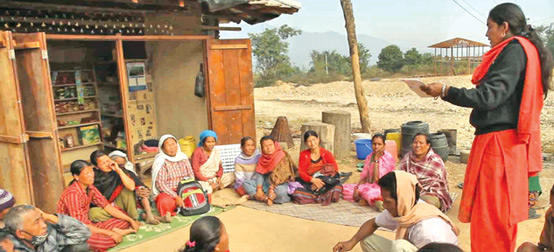Women, a powerful force in development
Business today focuses heavily on productivity, maximising potential
and tapping every last resource. Yet the global economy still under-uses
a staggering 48.4 percent of its available productive potential: women.
The IFC recognises that creating opportunity for women in the private
sector is essential for economic growth.
 Change cannot come soon enough for women in developing countries, who
often face economic exclusion and legal discrimination. But it is
equally critical for economies seeking to grow. Change cannot come soon enough for women in developing countries, who
often face economic exclusion and legal discrimination. But it is
equally critical for economies seeking to grow.
The IFC has worked across many developing countries to strengthen
women's education, rights, health, and access to the workforce. This is
not just a moral imperative. It's also good economics.
When women gain education, opportunity, and income, they help lift
themselves and their families - out of poverty.
They spend differently compared to men - buying higher-quality food,
health care, and education for their children.
They also save more. According to a Goldman Sachs study, narrowing
the gender gap in employment could raise per capita income in emerging
markets by up to 14 percent by 2020.
When companies have women on their boards and invest in
women-friendly workplaces, they financially outperform those without
female leadership.
They also see lower rates of absenteeism and less staff turnover.
These companies develop a better reputation, attract better talent, and
increase innovation.
IFC's Women on Board initiative is raising awareness of how companies
and economies benefit when corporate boards include similar numbers of
women and men. For example, IFC helped launch Pakistan's first training
program for women directors and inspired policy makers to revise the
country's Code of Corporate Governance to encourage gender diversity on
boards.
Likewise, the World Bank Group's WINvest program improves employment
opportunities and working conditions for women. The IFC released a
WINvest report to show how employing women increases productivity in the
workforce and a country's economy.
For example, the report found that a Vietnamese garment factory, Nalt
Enterprise, reduced staff turnover by 30 percent after setting up a
kindergarten for workers' children.
But change remains slow. More than 70 percent of women-owned business
in developing countries are underserved by financial institutions. The
overall gap in financing stands at $300 billion. To help close this gap,
IFC's Banking on Women Program has invested more than $800 million to
create opportunities and improve access to finance for women
entrepreneurs.
Bukky George is one of these women. Although she was ready to expand
her pharmacy business in Nigeria, she lacked sufficient cash flow. Most
local banks refused to finance her pharmacy - HealthPlus - was a new
woman-owned business with minimal collateral.
Through IFC's partnership with a local lender, she secured a loan.
HealthPlus now has 25 branches, with plans to set up 17 more in 2014.
Sixty-five percent of her employees are women.
Bukky George was fortunate - she was legally entitled to use her
house as collateral. Of the 143 economies studied in the Women, Business
and the Law report, 90 percent have at least one legal difference that
restricts women's economic opportunities.
Countries incur economic harm when they need married women to obtain
their husband's permission to work, or when property rights are unequal
for women and men. HealthPlus's expansion is just one example of how
strengthening women-owned business supports economic growth.
IFC and the Goldman Sachs have partnered to launch a $600 million
global facility dedicated to supporting women-owned small and medium
enterprises in developing countries. Such initiatives help women become
a powerful force for development - agents of the economic growth that
will eradicate global poverty.
Courtesy - World Bank |

